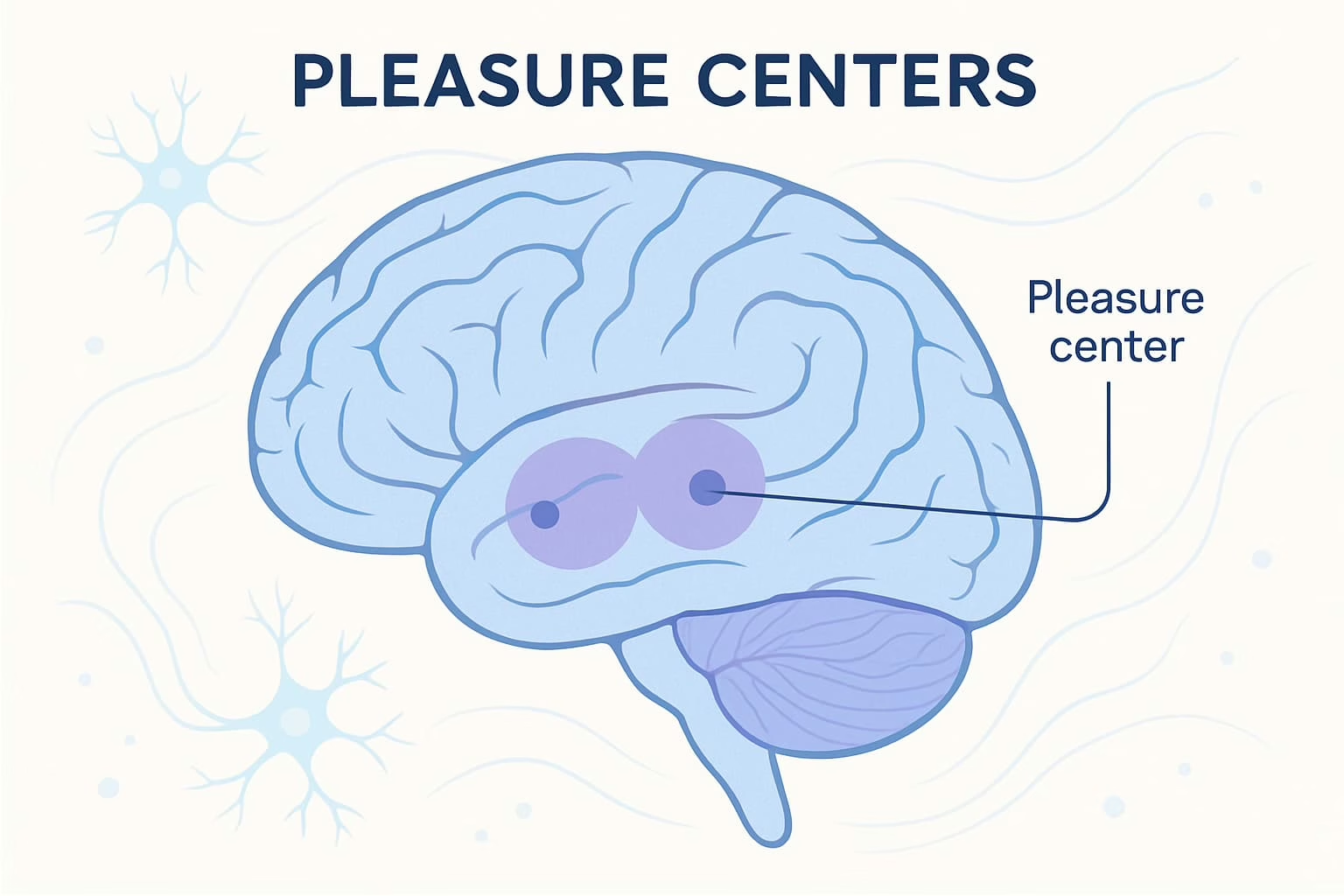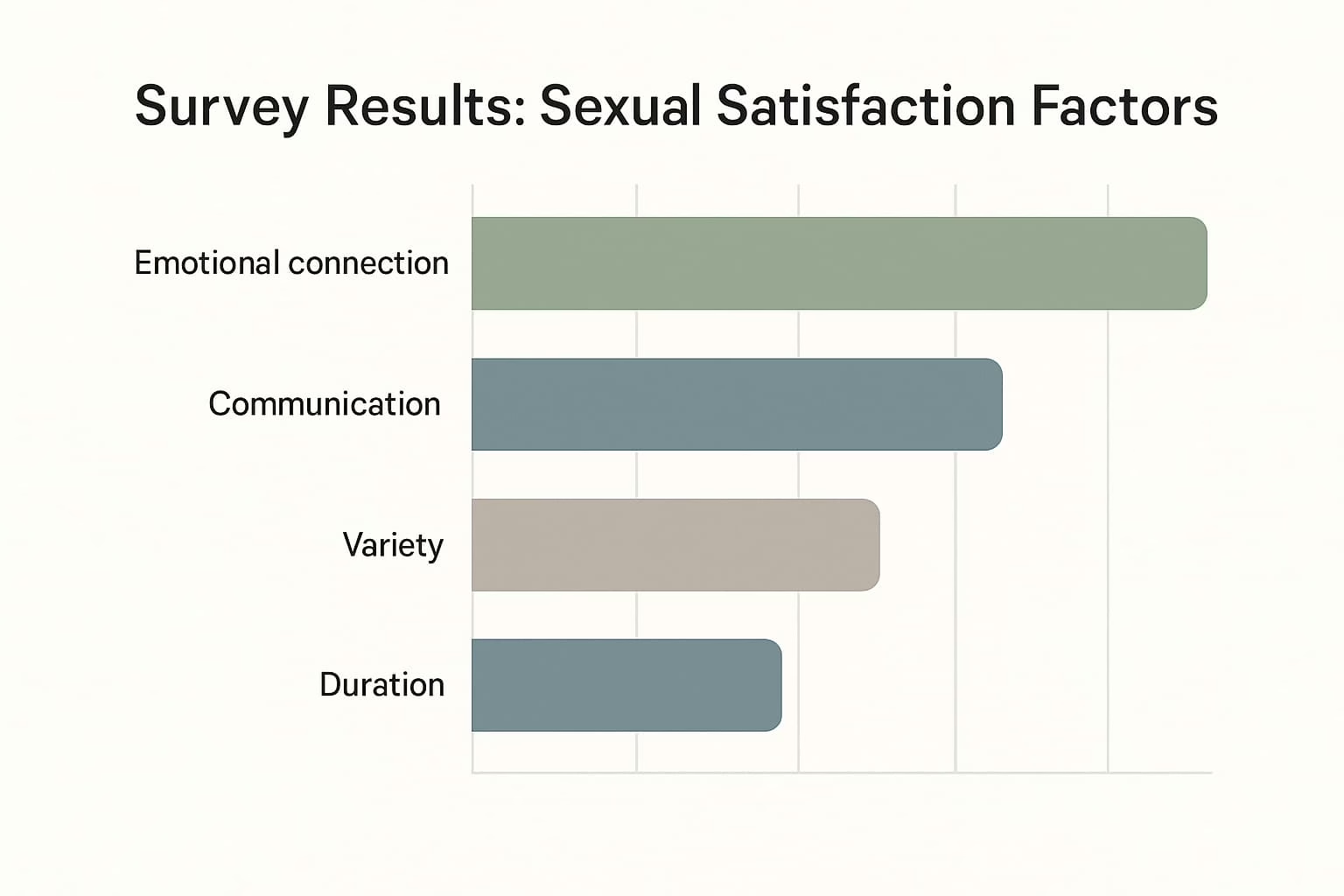Introduction
In our performance-driven culture, the myth that longer always means better has infiltrated nearly every aspect of our lives—including our intimate relationships. From Hollywood portrayals to locker room conversations, there’s a persistent belief that marathon sexual encounters are the gold standard of satisfaction. But what does science actually tell us about the relationship between duration and sexual satisfaction?

Recent research challenges long-held assumptions about sexual performance and satisfaction, revealing that quality trumps quantity in ways that might surprise you. This comprehensive exploration examines the scientific evidence, debunks common myths, and provides practical insights for enhancing intimate relationships.
The Science Behind Sexual Satisfaction
What Research Actually Shows
Multiple peer-reviewed studies have investigated the relationship between sexual duration and satisfaction, with findings that consistently challenge popular assumptions. A landmark study published in the Journal of Sexual Medicine surveyed over 34,000 participants and found that sexual satisfaction correlated more strongly with emotional connection, communication, and technique than with duration alone.
Dr. Barry Komisaruk, a renowned sexologist at Rutgers University, explains that the brain’s pleasure centers respond to variety, novelty, and emotional engagement rather than simply extended stimulation. His neuroimaging studies show that peak satisfaction often occurs within the first 10-15 minutes of sexual activity, with diminishing returns after that point.

The Quality vs. Quantity Paradigm
Research from the Kinsey Institute reveals that couples reporting the highest levels of sexual satisfaction focus on:
- Emotional intimacy and connection (rated as most important by 78% of respondents)
- Effective communication about desires (important to 71% of participants)
- Variety in activities and techniques (valued by 65% of couples)
- Mutual focus on pleasure rather than performance (emphasized by 69% of satisfied partners)
Interestingly, duration ranked significantly lower in importance, with only 23% of highly satisfied couples considering it a primary factor in their sexual happiness.
Debunking Common Duration Myths
Myth 1: “Real Sex” Lasts Hours
Popular media often portrays sexual encounters lasting for extended periods, creating unrealistic expectations. However, research by sex therapist Dr. Eli Coleman found that the average duration of penetrative sex ranges from 3 to 13 minutes, with most couples falling into the 5-7 minute range.
More importantly, studies show that attempts to artificially extend sexual encounters often lead to:
- Decreased sensitivity and pleasure
- Physical discomfort or pain
- Performance anxiety
- Reduced spontaneity and natural flow
Myth 2: Longer Duration Always Increases Partner Satisfaction
A comprehensive study in Archives of Sexual Behavior followed 1,200 couples over two years and found no significant correlation between extended duration and partner satisfaction. In fact, some participants reported that excessively long encounters led to:
- Physical discomfort
- Loss of arousal
- Feelings of pressure or obligation
- Reduced frequency of intimate encounters

Myth 3: Men Want Longer Duration More Than Women
Contrary to popular belief, research indicates that desire for extended sexual encounters doesn’t significantly differ between genders. A 2023 study in Sexual Medicine Reviews found that both men and women prioritized emotional connection and mutual satisfaction over duration, with women slightly more likely to prefer shorter, more intense encounters.
What Actually Matters for Sexual Satisfaction
Emotional Connection and Intimacy
Multiple studies consistently identify emotional intimacy as the strongest predictor of sexual satisfaction. Dr. John Gottman’s research at the University of Washington demonstrates that couples with strong emotional bonds report:
- 40% higher sexual satisfaction scores
- More frequent intimate encounters
- Greater willingness to communicate about desires
- Increased overall relationship satisfaction
Building emotional intimacy involves:
- Regular, meaningful conversations outside the bedroom
- Expressing appreciation and affection
- Creating shared experiences and memories
- Practicing vulnerability and emotional openness
Communication and Feedback
Research from the American Association for Marriage and Family Therapy shows that couples who communicate effectively about their sexual needs and preferences report satisfaction levels 60% higher than those who don’t. Effective sexual communication includes:
- Before intimacy: Discussing desires, boundaries, and preferences
- During intimacy: Providing gentle guidance and positive feedback
- After intimacy: Sharing appreciation and discussing what worked well

Mindfulness and Presence
Studies in mindfulness-based sexual therapy show remarkable results. Research published in Mindfulness journal found that couples practicing mindful intimacy experienced:
- 45% improvement in sexual satisfaction
- Reduced performance anxiety
- Increased body awareness and sensitivity
- Enhanced emotional connection during intimate moments
Mindful intimacy practices include:
- Focusing on sensations rather than performance
- Breathing together and maintaining eye contact
- Eliminating distractions (phones, television, mental to-do lists)
- Engaging all five senses during intimate encounters
Variety and Creativity
The brain’s reward system responds positively to novelty and variety. Neuroscientist Dr. Helen Fisher’s research shows that couples who regularly introduce new elements to their intimate lives maintain higher satisfaction levels over time. This doesn’t necessarily mean dramatic changes—small variations can have significant impacts:
- Changing locations within the home
- Varying time of day for intimate encounters
- Exploring different types of touch and sensation
- Introducing new forms of foreplay or afterplay
The Role of Individual Differences
Understanding Personal Preferences
Sexual satisfaction is highly individual, influenced by factors including:
- Personal history and experiences
- Cultural and religious background
- Physical health and sensitivity
- Stress levels and mental health
- Relationship dynamics and history
Research emphasizes that there’s no “one size fits all” approach to sexual satisfaction. What matters most is finding what works for each unique partnership.

Age and Life Stage Considerations
Sexual satisfaction factors change throughout life stages:
Young Adults (20s-30s): Often focus more on frequency and physical aspects
Middle Age (40s-50s): Increasingly value emotional connection and quality
Older Adults (60s+): Prioritize intimacy, companionship, and emotional bonding
Research shows that understanding and adapting to these natural changes leads to sustained satisfaction across the lifespan.
Practical Strategies for Enhanced Satisfaction
Focus on Foreplay and Buildup
Studies consistently show that extended foreplay correlates more strongly with satisfaction than extended intercourse. Research recommendations include:
- Spending 15-20 minutes on foreplay activities
- Engaging multiple senses (touch, sight, sound, smell)
- Building anticipation throughout the day
- Focusing on full-body pleasure rather than genital-focused activities
Create Optimal Conditions
Environmental factors significantly impact satisfaction:
- Physical comfort: Appropriate temperature, comfortable surfaces, adequate privacy
- Mental space: Reducing stress, eliminating distractions, creating relaxed atmosphere
- Emotional safety: Ensuring both partners feel secure, valued, and accepted
- Time allocation: Choosing times when both partners are alert and receptive
Practice Gratitude and Appreciation
Positive psychology research shows that couples who regularly express gratitude for their intimate experiences report higher satisfaction levels. This includes:
- Verbal appreciation after intimate encounters
- Regular acknowledgment of what partners do well
- Focus on positive aspects rather than areas for improvement
- Celebration of connection and intimacy as valuable in itself

When Duration Might Matter
Medical Considerations
While duration often isn’t the primary factor in satisfaction, certain medical conditions can affect sexual function:
- Premature ejaculation: May benefit from duration-extending techniques
- Erectile dysfunction: Often requires medical consultation
- Chronic pain conditions: May necessitate shorter, more comfortable encounters
- Medication side effects: Can impact both duration and satisfaction
Consulting with healthcare providers ensures that any underlying medical issues are properly addressed.
Relationship-Specific Factors
Some couples may find duration more important due to:
- Significant differences in arousal timing between partners
- Recovery from sexual trauma requiring gradual progress
- Long-distance relationships making encounters more infrequent
- Personal preferences based on individual sexual response patterns
The Importance of Realistic Expectations
Media vs. Reality
Research consistently shows that pornography and mainstream media create unrealistic expectations about sexual performance, including duration. Dr. Grubbs’ studies on pornography’s impact found that heavy consumers often develop:
- Unrealistic performance expectations
- Decreased satisfaction with real-world encounters
- Increased performance anxiety
- Focus on physical aspects rather than emotional connection
Building Healthy Perspectives
Developing realistic expectations involves:
- Understanding that sexual satisfaction varies widely among individuals
- Recognizing that media portrayals don’t reflect typical experiences
- Focusing on mutual pleasure rather than performance metrics
- Celebrating the uniqueness of each intimate encounter

Expert Recommendations
From Sex Therapists
Leading sex therapists recommend:
- Focus on pleasure rather than performance: Emphasize what feels good rather than meeting arbitrary standards
- Communicate openly and regularly: Discuss preferences, concerns, and experiences without judgment
- Practice non-demand touching: Engage in intimate touch without pressure for sexual outcomes
- Explore sensuality beyond intercourse: Appreciate all forms of intimate connection
From Relationship Researchers
Relationship scientists suggest:
- Prioritize relationship quality: Strong relationships support satisfying sexual experiences
- Address underlying issues: Resolve conflicts and stress that may impact intimacy
- Maintain individual well-being: Personal health and happiness contribute to sexual satisfaction
- Celebrate small improvements: Acknowledge positive changes rather than seeking perfection
Cultural and Social Influences
Challenging Performance Culture
Our society’s emphasis on performance and achievement extends into intimate relationships, often detrimentally. Research shows that couples who resist performance-oriented approaches and instead focus on connection and pleasure report:
- Lower anxiety levels during intimate encounters
- Higher overall relationship satisfaction
- More frequent expressions of affection and appreciation
- Greater willingness to explore and communicate
Promoting Sex-Positive Attitudes
Sex-positive approaches emphasize:
- Acceptance of diverse preferences and expressions of sexuality
- Focus on consent, communication, and mutual respect
- Recognition that healthy sexuality varies widely among individuals
- Importance of education and open dialogue about sexual health

Moving Forward: A New Paradigm
Embracing Quality Over Quantity
The evidence overwhelmingly supports a shift from duration-focused to quality-focused intimate relationships. This new paradigm emphasizes:
- Connection over performance
- Communication over assumptions
- Pleasure over pressure
- Individuality over standardization
Practical Implementation
To implement this approach:
- Regular relationship check-ins: Schedule periodic conversations about relationship satisfaction and needs
- Mindfulness practices: Incorporate presence and awareness into intimate encounters
- Education and learning: Continue learning about sexual health and relationship skills
- Professional support when needed: Don’t hesitate to seek guidance from qualified therapists or counselors
Conclusion
The question “Does longer sex really mean better sex?” has a clear answer from scientific research: No, duration alone does not determine sexual satisfaction. Instead, factors like emotional connection, communication, mindfulness, and mutual respect play far more significant roles in creating fulfilling intimate experiences.
This doesn’t mean that duration is irrelevant for everyone—individual preferences and medical considerations may make it important for some couples. However, the overwhelming evidence suggests that focusing on quality, connection, and communication will lead to greater satisfaction than pursuing arbitrary duration goals.
The key is to approach intimate relationships with curiosity rather than judgment, focusing on what works for you and your partner rather than trying to meet external standards. By prioritizing emotional intimacy, open communication, and mutual pleasure, couples can create deeply satisfying intimate connections regardless of duration.
Remember that every relationship is unique, and what works for one couple may not work for another. The most important factor is honest, ongoing communication about needs, preferences, and satisfaction levels. With this foundation, couples can build intimate relationships that are both deeply satisfying and authentically their own.
